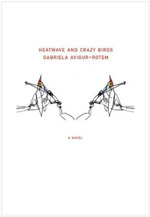
Heatwave and Crazy Birds is a dense and complex, but ultimately rewarding book about one woman's search for 'her' Israel. Rich with historical references but rooted firmly in the present, it is a bittersweet examination of the Israeli people's relationship with the land they live on and the problems it faces.
Loya Kaplan is an air-hostess who left Israel on the death of her father when she was a young woman. Now in her forties, she returns after being named as the sole heir in the will of her father's close friend, Davidi. Loya is ambivalent at best about Israel, and is unwilling to acknowledge that she is returning for good. As she begins to re-establish old friendships, she sees a new country. The one she left had been built on the ashes of the holocaust, where every inhabitant was a survivor with a story to tell. The new Israel is both happier and more afraid, wealthy but beset by the constant threat of violence. Loya's sense of displacement is enhanced by the sight of her childhood friends grown old, overweight and sad. However, her views of her own identity and of the forces that shaped her nation are altered when she begins to discover the story of her parents' and Davidi's time in the concentration camp at Terezin during World War II.
Heatwave and Crazy Birds is a difficult book to read. Initially very slow, it is full of dense sensory descriptions of Loya's perception of her new home country. The profusion of names combined with Avigur-Rotem's habit of obliquely referring to people and events before she actually describes them (sometimes many pages later) make for a confusing and disorientating read. The increase in pace as Loya begins to uncover details of her father's life in Terezin is welcome, but the abrupt transformation of the narrative from wistful reminiscence to historical mystery feels a little odd. However, for all of its faults, Heatwave and Crazy Birds is heartfelt and rewarding. It is not a nationalistic paean to a homeland, but a real, ambivalent and personal look at what it means to 'belong' in one of the world's most complicated countries. Avigur-Rotem's prose is occasionally beautiful, and the rich descriptions of the smells and colours of her homeland are wonderfully evocative.
The style and the pace can sometimes infuriate, but this is not a book to ignore. If your aim as a reader is to be enthralled,
swept up in a book you can't put down, then I suggest you look elsewhere. If your aim is to be challenged, provoked and to
understand a little more about the forces that have shaped the modern world, then you could do much worse than Heatwave and
Crazy Birds.

Dalkey Archive, paperback, 9781564786562
